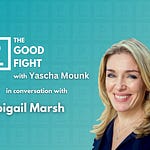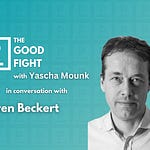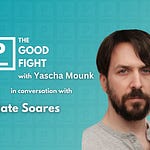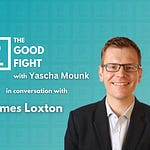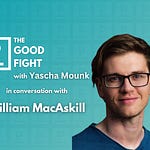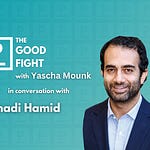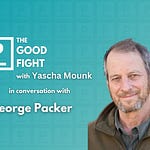Thanks for reading! The best way to make sure that you don’t miss any of these conversations is to subscribe to The Good Fight on your favorite podcast app.
If you are already a paying subscriber to this Substack or Persuasion, this will give you ad-free access to the full conversation with Ivan, plus the exciting bonus episodes we have in the works! If you aren’t, you can set up the free, limited version of the feed—or, better still, support the podcast by becoming a subscriber today!
And if you have a question for the upcoming second edition of our new monthly listener mailbag (available to paying subscribers!), please send it to goodfightpod@gmail.com.
Ivan Krastev is a political scientist, the chairman of the Centre for Liberal Strategies in Sofia, Bulgaria, and permanent fellow at the Institute for Human Sciences in Vienna. Krastev is the author of After Europe and, with Stephen Holmes, of The Light that Failed: A Reckoning.
In this week’s conversation, Yascha Mounk and Ivan Krastev discuss the advent of the Trump era in American politics; why liberals need to eschew their nostalgia for an older form of politics that now appears irretrievably lost; and how America's retreat will transform European culture.
The transcript and conversation have been condensed and lightly edited for clarity.
Yascha Mounk: We're starting to see some of the appointments that Trump is making on his foreign policy team. What do you expect the impact of Trump's election to be on the world?
Ivan Krastev: In my view, it's a turning point. This is not an election which simply surprised somebody. This is not simply that a new president is coming. First of all, you have somebody who comes and he comes with quite a clear mandate and he basically controls Congress, controls the Senate and has won the popular vote, which is quite important on the symbolic side. So this is one of the turning point elections, like with Roosevelt, with Reagan. Even after Trump, a certain foreign policy consensus on certain areas is going to survive. I have in mind both migration and industrial policy; already, you see this consensus after Trump and with Biden’s competition with China, but also the totally different way America sees itself in the world. And I don't believe this is going to be an isolationist president. None of the persons that he's putting in charge, not Marco Rubio, not others—they are everything else but liberal internationalists. They are people who basically believe in American power being used very selectively. And, in a certain way, their major position is that they care only about Americans and American interests and that others should care about themselves.
And this is not just Trump from today, this is Trump from 2016, also—he basically sees America as the hostage of the American-led world. He sees his foreign policy as the America liberation movement, liberating America from certain types of commitments, from certain types of ideological cliches and so on. This is the radical difference in the way he sees the world. It's not that America does not want to dominate, but he claims that in the period when we have been claiming that we dominated, in fact we have been hostage to our allies even more than to our enemies.
Mounk: So what does that look like? Let's say that you're right that this really becomes the new paradigm and that people elaborate on that in the next years. What does that look like? And I'm thinking in particular about the fact that there's an interesting structural constraint here. I mean, there's always been some tension in Transatlantic relations, and part of it was always that the United States had an outsized role, that it was just much bigger, more powerful, more militarily potent than any single other country within the Western Alliance. But structurally, this has actually shifted more and more because the United States is now much richer compared to Europe than it was 20 or even 10 years ago. America is continuing to have demographic growth while most of the European Union is seeing demographic decline.
America’s domination of this alliance for these structural reasons is just deepening and increasing. And that, of course, both leads Europeans to feel even more like they're a kind of vassal to the United States, particularly with a president now re-elected who is very unpopular in Europe. But I think it also helps to explain why Americans are saying, well, look, we're the ones who carry all the weight in this relationship. Because even if all of you spend the same amount of money on the military in GDP terms as we do, we would still have to provide 50%. And so if you're trying to sustain American dominance, but you want to stop being hostage to America's allies and the structural realities, what does that look like? How do you square that circle?
Krastev: I believe that he has very strong instincts that many things are changing. By the way, the first changes are just demographic. In the 1950s, when the classical idea of NATO was born, America was very much composed either of people who came from Europe or people who had been to Europe recently because of World War II. In a certain way, this was not simply a kind of an abstract strategic interest. Imagine New York from the late 1940s, early 1950s: you have the exiles from Nazi Germany, Europeans; you have European or East European exiles from communism; you have the American liberals. And this is where, for example, all this Cold War liberalism had been cooked up. And this was the ideology that was keeping the alliance together.
Now, most of the people in the Trump cabinet when it comes to foreign policy are coming from Florida, they're coming from Miami, and this is not accidental because you have a totally new worldview based, first, on the new role of the Latino voters in American elections. But secondly, in Miami, you're going to see basically all the refugees from progressive governments. When you're losing elections in Latin America, be it Bolsonaro or somebody else, you don't go to New York, you go to Miami. And this type of American also sees Europe differently because, during the Cold War, Europe was the central stage and now the central stage is Asia. So in a strategic point of view, Europe is neither so important culturally for the United States, nor strategically to the United States. So from this point of view, Trump has a point, but then Europe has a choice to make. Is Europe, if we're going to increase our military budgets, going to spend all these budgets on buying American weapons? Or is Europe going to be interested in trying to create its own defense industry? And for the moment, of course, Europe is very shattered by what is happening.
Mounk: Your last major book is The Light That Failed, which is a brilliant reckoning, as the subtitle says, with why the promise of liberalism hasn't fully been realized, particularly in Central Europe, and why countries that looked like they were embracing liberalism after the fall of communism have recently turned away.
If you were to write a new edition of that book that is purely based on the United States, one of the ways to interpret Donald Trump's victory might be the idea that some of the basic appeal of liberal norms and values have failed. And perhaps there's a way of saying that actually a lot of the establishment on the left gave up on some of the core liberal norms and that part of the appeal of Trump was, at least on certain points, his promise, whether or not we want to believe it, that he would try and restore those liberal norms.
How do you think Trump's victory reflects on the standing of liberalism within the United States?
Krastev: Listen, there were three important things about, in my view, the end of the Cold War, which is still kind of under-discussed after all these years of discussion. One is that there were these major assumptions in 1989 that the world is going to change, but the West is going to remain the same. And suddenly in 1989, one of the things that happened is that time was translated into space: during the Cold War, the communists had their own version of the future; and there was a liberal version. And then came 1989, and the communists ideologically disarmed themselves. But what happened is suddenly movement in space became movement in time: As a Bulgarian going to Germany, I was not simply moving to another place, I was moving to my future. The future of the non-Western world was the West, while the West basically was going to follow its development, which is not going to be very different from what it is at the same time. In a certain way, the first thing that Trump really got right was telling the Americans the end of the Cold War transformed us no less than the East. And in a certain way, you believe that you are a victor, but are you really a victor? Is China not the biggest victor of the opening? And this is the moment where, in my view, every major political regime goes into fundamental crisis, not when the losers revolt, but when the winner starts to feel themselves as losers.
This is what Trump told the Americans. The second interesting story in my view is, by the way, now when we revisit 1989, It's paradoxical to see how much richer the year was. We remember only the fall of the Berlin Wall. But in 1989, other ideologies also believed that something very important happened. Talk to the Islamists. And they're going to tell you that what happened in Kabul in 1989 was the first time when political Islam defeated the superpower, when the Soviets basically were forced to withdraw from Afghanistan. And by the way, in 2019, the independent Levada Center was doing an opinion poll in Russia. And there was a question, what is the most important event that happened in 1989? And you have all the usuals—Polish elections, Tiananmen, the fall of the Berlin Wall, and the majority of the Russians said the withdrawal of the Soviet troops from Afghanistan. And then you have Tiananmen, which, when you perceive it from the mid-1990s, was the failure of democratization in China. But it was a temporary failure. Now the Chinese are celebrating it as showing the resilience and the strength of the communist system versus the West and particularly in decoupling capitalism from democracy. And by the way, 1989 was also the year in which Elon Musk left South Africa, and the year in which Milosevic made his most important political speech in Kosovo creating a new standard of post-Cold War nationalism.
Souhaitez-vous - ou quelqu'un que vous connaissez - avoir accès à tous ces articles et conversations en français ? Cliquez sur ce lien et activez “en français” sous Notifications ! 🇫🇷
Mounk: It sounds like you're pitching me on a book that you should write called “1989.”
Help me understand what lasting changes Trump might bring to the United States and to the role that liberal worldview plays in the United States. Beyond the issue of immigration, how different will America look 10 or 20 years from now? You're saying, and I had the same instinct and wrote the same thing on the night of the election, that this election really is the beginning of the Trump era. But when you look at past eras, when you look at Reagan, look at FDR, you look at Theodore Roosevelt, they changed some things, and many things remained the same. What are the things that are going to change? What are the things that are going to remain the same?
Krastev: For Europeans these days, understanding America is more difficult than it was 30 years ago. They have gone in slightly different directions demographically and politically. Nevertheless, there are many commonalities. What we know from places like Poland or Hungary is that it is one thing for populist leaders to be elected, but it is totally different for the populist leaders to be elected for a second time after being in opposition. Kaczynski, who came to power in 2015, is very different from the Kaczynski of 2004. And by the way, Tusk, who defeated Kaczynski in 2007, was very different from the Tusk who defeated Kaczynski in 2024. One thing that you cannot do anymore is to basically fight Trump by claiming that you're the party of normalcy. Normality doesn't matter anymore because a new normality is emerging. And in my view, this was quite interesting to see to what extent some magic words like fascism and so on didn't work at the end of this campaign.
And by the way, the people claimed that they believe that democracy is under threat in Pennsylvania—most of them voted for Trump and not against him.
Mounk: I saw that poll as well. It was very striking. Just to make one obvious link to what you were saying earlier. You were saying that these elections should make us reinterpret 1989. In a much more straightforward and obvious way, this election should make us reinterpret 2016. It was possible to think of 2016 as an aberration. Now it's no longer possible to think of it as an aberration.
Krastev: Absolutely. In 2016, it was a surprise. The opposition, the Democratic Party, cannot resist Trump in the way they resisted him in 2016. And not simply because back then he didn't have his own movement, back then it was not very clear what his mandate was, back then he didn't have his agenda. But obviously they are entering a totally different period.
And in a certain way, this kind of a change is very much a pressure on them to change themselves. And this is also what is coming, what I was saying in Europe. The other thing that is going to change, and in my view is quite interesting, is that particularly in the case of the United States, there will be a very strong pressure on the institutions. Because he comes as a revolutionary power, and he basically is very mistrustful of the American institutions. He wants to tear off the masks. So from this point of view, the way he talks about the institution is not very different from the way the different revolutionary parties on the left and on the right talk about institutions. And one of the institutions that was most resilient to him during 2016-2020, of course, was the military. We're going to see a lot of changes in the army, change of personnel and so on. And this is a major change. So from this point of view, America is going to have, of course, a softer version of the Eastern European 1989. This is a change of the elites. This is a change in the way you're making your career. Certain things that, until yesterday were an advantage for you, you start to see as disadvantages. Suddenly, you're going to see that there is much more agreement between Democrats and Republicans on certain policies than they used to have yesterday.
Like you, I do believe it's a new era. Just before the elections, I was rereading the old Huntington book written at the end of the 1970s, The Promise of Disharmony. And this was his reflection basically on what happened in America in the 1970s. And his major argument was: American politics is not based on the polarization between left and right, American politics is very much structured around the American promise and the failure of this promise to be realized. Listen, some of the attacks on the American political system this time does not come necessarily from the promise of the American dream. The American dream was challenged both on the left and on the right. And I believe this is kind of a new situation. And this is why some of the old cliches, some of the old strategies of yesterday are not going to work. There are going to be major questions also about the new divides that came up this election, particularly the educational and gender divide. This is a new political world, in my view, which is going to come with a new political generation and with new explanations.
Mounk: I've been struck for the first week since the election by how orderly the transition appears to be. He is clearly much better organized than the last time around and has a much more coherent plan of what he wants to do with power. And so I think he's going to be much more capable of pushing his agenda. I think he has a much better sense of where limits on his power lie which he bristles against, either because there are people in the federal bureaucracy or in the military who he feels aren't sufficiently loyal to his political agenda.
Now, at the same time I do think that there is a difference between Hungary and the United States, in particular, which is that American democracy is much older, that the country is much richer, which means that its corporations and its media outlets are much less dependent on government subventions, that there is a very long tradition of civilian control over the military (I suppose that's also true in Hungary, but it's a distinction with regard to many other democracies that proved to be quite vulnerable, like Turkey). But there's a vastly greater number of veto points that, even though Trump now controls the House and the Senate and has sympathetic judges on the Supreme Court (in certain ways), it is not at all clear, for example, that they're going to abolish the filibuster—there are some Republican senators who are quite locally opposed to that. We've seen the majority of the Supreme Court disagree with Trump on important things like the lawsuits over the 2020 election.
So how does that similarity of a more organized Trump, more determined to subvert controls of his power, stack up?
Krastev: No, no, you're totally right. First, after 2016, the encounter between Trump and power was like blind dating. He didn't know exactly what he wanted and the power didn't know exactly who he was. But to believe that the United States is going to transform to Hungary really totally challenges some very obvious things. America is a federal state with a very decentralized power.
Hungary is a society which is ethnically extremely homogeneous, on a totally different scale. Orbán also had, as a result of the electoral system, a constitutional majority. He has written a new constitution. It's totally different. But that does not mean that you can make Hungary out of the United States. The nature of the economy is different. The nature of the role of the world is different. Even if the United States goes very wrong, even if the United States becomes an autocratic state, it's going to be very different from Hungary. So one of the things basically is to try to surf between this idea that it can never happen here, which I don't believe. I do believe it can happen anywhere.
The problem we face today is not that we have more autocratic regimes than democracies. The real problem is that it's not easy these days to distinguish between democracy and authoritarian regimes. We talk about India, we talk about Turkey, we can talk about the United States. You remember this famous definition of the judge who said about pornography: “I cannot define it, but I know it when I see it.” With authoritarianism these days it’s just the opposite: We can easily define it, but we cannot be sure that we are going to recognize it when we see it. And in my view, this is quite important because in order to understand Trump, and particularly if you want basically to resist Trump, you should be very specific. You should not be resisting some kind of universal authoritarian trend, but you should be very much rooted in American society and what is happening in this society’s institutional setup.
Möchten Sie meine Artikeln und Gespräche auf Deutsch direkt in Ihre Mailbox bekommen? Klicken Sie diesen Link und schalten Sie unter Notifications “auf deutsch” an! 🇩🇪
Mounk: We've seen not just an astonishing class inversion in which the Democrats won the vote of people making more than a hundred thousand dollars a year and probably lost voters who make less than that, but also an astonishing inversion over the course of the less than two decades in who's the establishment. Part of the attraction of Trump and his movement is that they were the outsiders railing against the center. And part of the weakness of Democrats from Hillary Clinton to Kamala Harris is that they are seen as representatives of an elite that is deeply resented. That's a fundamental cultural shift that is really interesting. How and why did that happen? And how long will that remain the case? I mean, if we are at the beginning of a Trump era (I think it’s still a big question mark) and his movement basically dominates American electoral politics for the next 10 or 20 years, presumably, at some point, the old elite is out, and, by definition of being out, will start reconstituting itself.
One thing that I wrote when I was trying to make sense of how Persuasion should cover the next four years of Trump's presidency is to say that perhaps, in a broader sense, we philosophical liberals should recognize that we're no longer the establishment. We've been on the back foot. We've been trying to defend the status quo, or at least what's good about it. And for some good reasons. But of course, being part of the establishment also makes you overly cautious, makes you try to apologize for things or try to defend things that perhaps are indefensible, makes you insufficiently irreverent, a little bit judgmental, wanting to tell people how to talk and how not to talk.
Is it time for those of us who believe in philosophical liberalism to consciously assume the role of the outsider, of the irreverent forces assailing the center, or on the contrary, do we need to try and stabilize the institutions to shore up the order that is now being attacked from inside the White House?
Krastev: Listen, when it comes to practical politics, normally you do both, but intellectually, and your question was how we should frame the time that we're going. Listen, if everything goes according to the constitution, Trump is going to be in power for four years. By the way, this also makes him very different from Orbán or Kaczynski, where in our system, at least theoretically and legally, they can stay as long as they want because we do not have term limits on prime ministers.
But my idea is that there is nothing worse in politics than defending the status quo that does not work, that does not exist. I do believe that there is a major difference between defending values and defending the status quo. And quite often when people defend the status quo, they pretend that they simply defend values. Democracy is an experimental society. Democracy was changing all the time. So from this point of view, the major mistake is to try basically to defend democracy in the way you defend the fortress. Listen, there are going to be changes. And some of the changes that he's going to make are going to be, in my view, very dangerous and they're going to be unwelcome. Also, there's going to be some changes that probably in the long term we're going to see as opening possibilities that we didn't have today. But we should try to see ourselves as a party of change. But just saying that you're the party of change, it's also what kind of change?
Biden was not simply somebody who bet on normalcy. He bet on something much more radical. He said COVID is almost like the Great Depression or World War II. This can change society. This can bring back the idea of the big government. People really have a demand for the state that cares. And he spent incredible money and he basically went with a major public investment. And just before he collapsed in the debate, people were talking about him as one of the most transformative presidents after Roosevelt. The question is why these policies did not work at least politically in these elections? Why not simply Harris, but the Biden transformation, was not supported by the voters? And secondly, the same about foreign policy. He bet on a “democracy versus authoritarianism” foreign policy. And by the way, he stuffed his administration, in my view, with some of the most gifted diplomats and foreign policy thinkers that America had, and at least Democratic Party had. It's not every time that you're going to have somebody like Bill Burns or Jake Sullivan. So it's not the fact that you have mediocre people or didn't have a project. What was basically misunderstood was the response of the people.
What has changed in American society that probably many of us got wrong? And from this point of view, just saying all liberals should go back to the radicalism of the 1920s, or do what Roosevelt did, is not going to work. I do believe that you should be the party of change, but first you should try to imagine a change that is different than simply going back. And in the way I'm afraid of nostalgic right-wing politics, I'm also afraid of nostalgic left-wing politics. In a certain way, you should try to see society as a new one and with new types of conflicts and with, in certain ways, new promises. And I could be very wrong on this, but just as people like to talk about the return of history, I do believe that the idea of the future has returned, and the future is not perceived as an opportunity anymore, but as a threat. So the clash between left and right is the clash between two extinction rebellions. On the left, very much about climate, a universalist one; on the right, it is very much about demography. On the left it is the “last man,” on the right it is the last white man, or the last American. And in my view, this understanding, this totally new politics is going to answer the question of what it means to be the party of change in the Trump era. Because if you're right, and I have the feeling that you're right, if there is a Trump era, it is going to survive and exist even when Democrats are back in power for a certain period of time in the way the Roosevelt era didn't end with the Roosevelt government, and the Reagan era didn't stop with Clinton, but was, in a certain way, confirmed by it.
In the rest of this conversation, Yascha and Ivan discuss what a sensible policy toward China might look like for the United States and Europe. This discussion is reserved for paying members...
Listen to this episode with a 7-day free trial
Subscribe to Yascha Mounk to listen to this post and get 7 days of free access to the full post archives.






